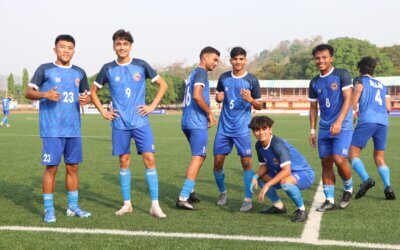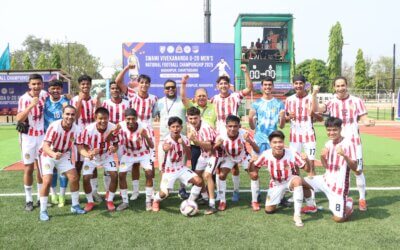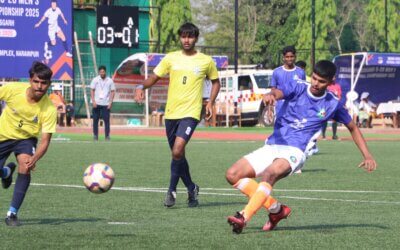The team went on to finish fourth at the 1958 Asian Games in Tokyo. But four years later, they won their second Asian Games Gold in 1962. The team, led by Chuni Goswami, beat the Korea Republic 2–1 in front of a 100,000-odd partisan crowd at the Senayan Main Stadium in Jakarta. PK. Banerjee and Jarnail Singh scored within three minutes of each other to seal the victory for India.
Two years later, India participated in the 1964 AFC Asian Cup where they finished runners-up, losing out to the hosts, Israel, by two points. At the 1970 Asian Games, India came away with bronze as Amar Bahadur scored the winner to beat Japan 1–0.
The team began the 1990s by winning the inaugural SAFF Championship in 1993, a feat they repeated in 1997 and 1999.
In 2003, India participated in the Afro-Asian Games held in Hyderabad where they reached the final after defeating Zimbabwe 5-3, a team ranked 85 places above India in the FIFA rankings at that time. However, they went down 0-1 to Uzbekistan in the final.
In 2007, under the guidance of Bob Houghton, India won the Nehru Cup defeating Syria 1-0 in the final. The squad followed that up with an impressive performance at the 2008 AFC Challenge Cup, which was initially hosted in Hyderabad and saw the final shifted to Delhi. India breezed through the group stage before defeating Myanmar in the semi-finals. Sunil Chhetri then lit up the final with a scintillating hat-trick to secure a 4-1 victory against Tajikistan, which also secured India qualification for the 2011 AFC Asian Cup. In the final tournament in Qatar, India were defeated by Australia, Korea Republic and Bahrain.
Houghton’s team again lifted the Nehru Cup in 2009. In the 2012 edition, India pipped Cameroon on penalties in the final under the guidance of Wim Koevermans. India also emerged SAFF champions in 2009 in Dhaka (with an U23 squad) and 2011 in New Delhi. After going down to Afghanistan in the 2013 SAFF final in Kathmandu, India retook their regional crown with a 2-1 win over the same rivals in Thiruvananthapuram in 2016.
Post 2015, the Blue Tigers, coached by Stephen Constantine, remained unbeaten for 18 months from June 2016 to November 2017 in 12 International matches wherein a giant leap of faith propelled India from a FIFA Ranking of 173 (in 2015) to 96 (in July 2017) – their best ever since February 1996. India topped their 2019 AFC Asian Cup qualifying group with victories over Kygryzstan, Myanmar and Macau. India recorded their first win in 55 years at the Asian Cup as they beat Thailand 4-1 on a sensational night in Abu Dhabi. However, they bowed out of the group stage after defeats to hosts UAE and Bahrain, following which Constantine announced his resignation.
In May 2019, Croatian World Cupper Igor Stimac was appointed as India's head coach. Under him, the team held the Asian champions Qatar to a 0-0 draw in Doha in a FIFA World Cup 2022 qualifying match in September 2019 to produce one of the most stunning results in Indian football history. India also lifted the 2021 SAFF Championship in Male, beating Nepal 3-0 in the final, and the 2023 SAFF Championship in Bengaluru, with a penalty shoot-out win over guest side Kuwait.
India also created history by making it into consecutive AFC Asian Cups as they seamlessly passed their qualifying group by beating Cambodia, Afghanistan and Hong Kong in Kolkata in June 2022. In the final tournament in Qatar in January 2024, India endured a winless campaign after going down to Australia, Uzbekistan and Syria.
In July 2024, Manolo Marquez was appointed as the new Blue Tigers head coach.
Read Less

 Shop
Shop







